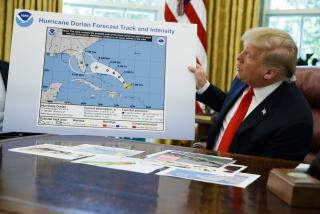Hearings Damage the President More Than His Policies
- Share via
Even though the smoking gun did not go off at the Iran- contra hearings, pollsters have been busy assessing the damage. The preliminary finding: President Reagan has suffered a serious loss of credibility, but his policies have not been entirely discredited.
Most Americans certainly reject the idea of trading arms for hostages. Reagan was penalized for that error last winter, when the arms sales to Iran first came to light. Now the President says that he, too, rejects that policy. As the scandal continued to unfold, however, Reagan’s approval ratings remained steady. The Administration has even gained ground on the contra issue, more as a result of Lt. Col. Oliver L. North’s credibility than of Reagan’s.
North has been the biggest puzzle. He is overwhelmingly popular, but the public disapproves of what he did. According to various polls, three-fourths believed that he was telling the truth, but a majority poll felt that he was covering up for higher-ranking Administration officials; two-thirds called him a true patriot, but almost two-thirds refused to call him a national hero; more than two-thirds thought that he had authorization from his superiors “for everything he did,” but more than half felt that he “went too far with his actions.”
What’s going on here? The answer is populism. Americans see North as a dedicated soldier taking the rap for a bad policy. When asked by ABC News to describe North as a hero, a villain or a victim, 64% said “victim.”
Remember Lt. William Calley, court-martialed for his role in the My Lai massacre during the Vietnam War? The public came to his defense for the same reason--most people thought that he was taking the rap for a bad policy. The polls showed no great enthusiasm for our Vietnam involvement and no support for a policy of murdering innocent civilians. But people felt that the real responsibility lay with the White House and the big brass in the Pentagon, not with the soldiers doing the fighting and dying. Calley, like North, was seen as having been put in a difficult situation and told to do an impossible job.
In the ABC poll, three-fourths of those who were interviewed thought that North and Adm. John M. Poindexter received direct orders from someone higher up in the White House. Who, exactly? A majority named the President.
The fact is that most people continue to believe that Reagan is lying. Although the numbers diminished slightly after Poindexter’s first week of testimony, majorities still thought that Reagan lied when he said that he did not know about the diversion of funds to the contras. Two-thirds believed Poindexter’s testimony that Reagan had signed a document authorizing a direct arms-for-hostages trade with Iran, and, of that number, more than 60% thought that Reagan was lying when he said that he could not recall signing the document.
In other words, in the public’s view North and Poindexter did not get Reagan off the hook. Their testimony implicated the President and other high Administration officials in the cover-up. Most Democrats wanted to see Reagan damaged but not destroyed by the scandal. And that is exactly what has happened.
Hence another puzzle: Reagan’s approval rating was hardly affected by the hearings. It has stood at 50% to 53% since early this year. The big drop-off in public support came last November and December. As soon as the public learned of the arms deal, it docked 20 points from the President’s approval rating.
When the Los Angeles Times asked people in July what upset them the most in the affair, the leading answer was still the arms deal with Iran (27%). The cover-up, which the public suspected all along, came in second (20%). Only 4% were most upset by the diversion of funds to the contras. Even though the contras were the smoking gun that could have led to impeachment proceedings, the public was far more disturbed by the spectacle of the President of the United States selling arms to Iran.
Indeed, the polls showed public support for contra aid going up during the week of North’s testimony, from 2-1 opposed to a roughly equal split. Can it be sustained? Interventionist sentiment went up sharply at the time of the Iran hostage crisis in 1980 and again after the Grenada operation in 1983, only to subside quickly in each case.
This sudden shift in public opinion on a key foreign-policy issue has two implications. One is that Democrats must be wary of making Nicaragua an issue of principle. The public’s opposition to contra aid is motivated by isolationism, not ideology, and it can reverse very quickly if a credible figure offers a strong anti-communist appeal. The other implication is that Reagan, having been wounded by the Iran-contra affair, probably lacks the credibility to make that case. North may be the only person who can do it.
DR, DANZIGER The Christian Science Monitor
More to Read
Get the L.A. Times Politics newsletter
Deeply reported insights into legislation, politics and policy from Sacramento, Washington and beyond. In your inbox twice per week.
You may occasionally receive promotional content from the Los Angeles Times.










